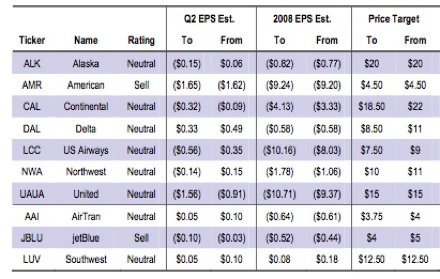
Closing price for oil today was $125.96. That is an increase of 2.27 on the day.
Looking at this news today, and absorbing all that has been swirling around the industry this week, including the testimony of both Northwest and Delta Air Lines’ execs on Capitol Hill this week, I think there are some things that need to be said.
This week Steve Wallach, chairman of the United MEC of the Air Line Pilots Association issued a statement that said, “We are aware of continued speculation in the media of a possible merger between United Airlines and US Airways, and have serious concerns that the highly touted financial benefits to be derived from such a merger are unlikely to be achieved because these benefits are based on assumptions that have no basis in reality,” Wallach said. “We therefore believe that a merger with US Airways should be a last resort and not a first choice for United.”
I’ve been thinking about this statement.
First, who has been touting the “financial benefits” to a merger between US Airways and United?
I certainly haven’t heard any, and you sure as heck haven’t heard anything remotely close to this coming from Doug Parker or Glenn Tilton.
At least not yet.
So I’m not sure what benefits he’s talking about, nor what assumptions. I think it’s kind of hard to judge anything until you have something in front of you to pick apart. This smacks to me of the pronouncements from the Delta MEC when US Airways tried to do a deal with Delta. Before the details of the deal were even delineated, the MEC was out trashing it.
And why wasn’t the United MEC making similar comments about a potential deal with Continental Airlines? Probably because the pilots at United were too mesmerized with the possibility they could bump up to the Continental pilots’ pay rates. As this tidbit was mentioned to me by more than one United pilot — I have to assume this was the case.
As to his comment that a merger with US Airways should be a “last resort,” and not a first choice, I have to really scratch my head on this one.
Steve, Continental Airlines management has rejected a merger with your airline. There are no other reasonable potential partners out there. The out-of-bankuptcy financing package that United entered into when it exited bankruptcy was predicated on a merger or buyout occurring. The airline is too leveraged not to do a deal.
Did you look at the first quarter earnings report from United?
If you did, it should be pretty clear that if things stay “status quo” the airline is going to blow through whatever cash it now has (minus that nice shareholder Christmas present in December) in no short order.
In a perfect world, I don’t think anyone would be looking to mergers as an answer to a problematic airline industry. Unless it was maybe those greedy investment bankers.
But this is not a perfect world.
In fact, I’d argue that with oil prices in this range, we’re looking at the worst possible world for an airline to make a buck.
We’re talking survival here.
And I think that all employees of this industry need to understand that union squabbles and pay rates and everything else are going to have to take second seat to something else — survivability.
Oh, don’t get me wrong. I’m the one who annointed United’s Glenn Tilton as the Master of Greed. He received his own special award from PlaneBusiness Banter for it. And I think management at United has not done enough to overhaul its underlying operation. And they did little that required heavy lifting during bankruptcy — except try and wrangle an ATSB loan and do away with their employee pensions.
But we all have to understand that we have to start looking at airlines as big companies with big infrastructure costs, and lots of moving parts. Some of those parts are making money and some aren’t. Some made money at $60/barrel oil. Some still made money at $90/barrel oil. But most of them are not going to continue to make money at $125 or $130 barrel/oil or higher.
When it gets right down to it, the parts that are making money are going to be kept, and the parts that aren’t, are going to have to be divested, put on a shelf, or parked in Arizona.
Passengers are going to have to get used to higher fares and fewer flights.
And airline employees are going to have to understand that we should not be surprised if we see airlines pulled apart, with pieces going here and other pieces going there. Furloughs, lay-offs. They are both very distinct possibilities. Talking to one analyst this week he and I were wondering just what airline is going to be the first to announce an across the board cut in employees — beginning in the fall.
Unless oil drops — we’re going to see this happen.
Delta- Northwest is a perfect example.
Either Delta’s Richard Anderson is living in la-la land, (which I don’t believe) or I think it’s a safe bet that after the merger of these two airlines is approved — we are going to see cuts and changes that no one has even begun to guess about at this point in time.
So — a potential merger with another airline should be a “last resort?” I think United and its employees should be happy that there exists an airline that would even consider merging with it at this point in time.
There are many more horrible fates that could befall United Airlines than a potential merger with one of the best management teams in the industry. We all have to understand what the situation is now in the U.S. airline industry. No airline is really immune from potential extinction. But the bigger you are, the better you are managed, and the more resources you can tap — the better your chances for survival are going to be.
Tickers: (Nasdaq:UAUA), (NYSE:LCC)
Technorati Tags: airline earnings, airline industry news, airline mergers, airline stocks, airlines, ALPA, Continental Airlines, United Airlines, US Airways








